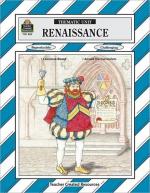|
This section contains 481 words (approx. 2 pages at 300 words per page) |

|
No matter how noble the Renaissance ideals of humanism might have seemed at the time, without the economic boom that began in the fourteenth century to finance its greatest artists and writers and build its cities and trade empires, those ideals might have withered away in obscurity. Instead, strategically located trading ports, like those in Italy, generated huge profits, inspiring several European monarchs to begin exploring the uncharted seas for more trade routes.
Although in the past daring explorers, particularly Norsemen, had ventured far from European bases, none had dispelled the common belief that the waters past Morocco boiled because of liquid fire from the sun, while the waters to the west turned into perilous swamps. To prepare sailors for such hazards, the prince of Portugal, known as Henry the Navigator (1394–1460), founded a maritime center and observatory to teach sailors. Under his patronage, Portugal...
|
This section contains 481 words (approx. 2 pages at 300 words per page) |

|




